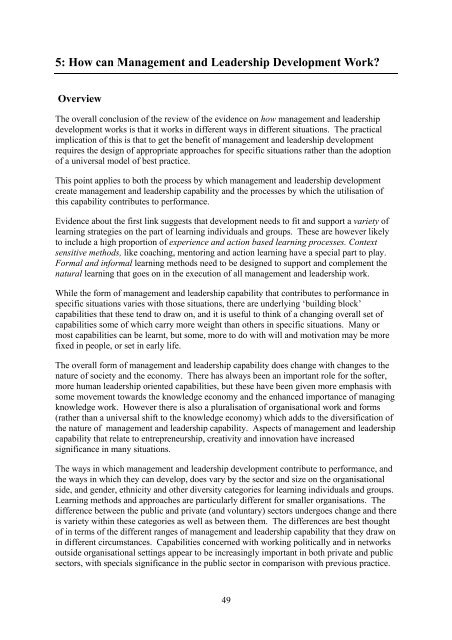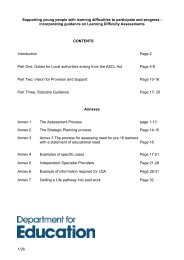The Development of Management and Leadership Capability and its ...
The Development of Management and Leadership Capability and its ...
The Development of Management and Leadership Capability and its ...
You also want an ePaper? Increase the reach of your titles
YUMPU automatically turns print PDFs into web optimized ePapers that Google loves.
5: How can <strong>Management</strong> <strong>and</strong> <strong>Leadership</strong> <strong>Development</strong> Work?<br />
Overview<br />
<strong>The</strong> overall conclusion <strong>of</strong> the review <strong>of</strong> the evidence on how management <strong>and</strong> leadership<br />
development works is that it works in different ways in different situations. <strong>The</strong> practical<br />
implication <strong>of</strong> this is that to get the benefit <strong>of</strong> management <strong>and</strong> leadership development<br />
requires the design <strong>of</strong> appropriate approaches for specific situations rather than the adoption<br />
<strong>of</strong> a universal model <strong>of</strong> best practice.<br />
This point applies to both the process by which management <strong>and</strong> leadership development<br />
create management <strong>and</strong> leadership capability <strong>and</strong> the processes by which the utilisation <strong>of</strong><br />
this capability contributes to performance.<br />
Evidence about the first link suggests that development needs to fit <strong>and</strong> support a variety <strong>of</strong><br />
learning strategies on the part <strong>of</strong> learning individuals <strong>and</strong> groups. <strong>The</strong>se are however likely<br />
to include a high proportion <strong>of</strong> experience <strong>and</strong> action based learning processes. Context<br />
sensitive methods, like coaching, mentoring <strong>and</strong> action learning have a special part to play.<br />
Formal <strong>and</strong> informal learning methods need to be designed to support <strong>and</strong> complement the<br />
natural learning that goes on in the execution <strong>of</strong> all management <strong>and</strong> leadership work.<br />
While the form <strong>of</strong> management <strong>and</strong> leadership capability that contributes to performance in<br />
specific situations varies with those situations, there are underlying ‘building block’<br />
capabilities that these tend to draw on, <strong>and</strong> it is useful to think <strong>of</strong> a changing overall set <strong>of</strong><br />
capabilities some <strong>of</strong> which carry more weight than others in specific situations. Many or<br />
most capabilities can be learnt, but some, more to do with will <strong>and</strong> motivation may be more<br />
fixed in people, or set in early life.<br />
<strong>The</strong> overall form <strong>of</strong> management <strong>and</strong> leadership capability does change with changes to the<br />
nature <strong>of</strong> society <strong>and</strong> the economy. <strong>The</strong>re has always been an important role for the s<strong>of</strong>ter,<br />
more human leadership oriented capabilities, but these have been given more emphasis with<br />
some movement towards the knowledge economy <strong>and</strong> the enhanced importance <strong>of</strong> managing<br />
knowledge work. However there is also a pluralisation <strong>of</strong> organisational work <strong>and</strong> forms<br />
(rather than a universal shift to the knowledge economy) which adds to the diversification <strong>of</strong><br />
the nature <strong>of</strong> management <strong>and</strong> leadership capability. Aspects <strong>of</strong> management <strong>and</strong> leadership<br />
capability that relate to entrepreneurship, creativity <strong>and</strong> innovation have increased<br />
significance in many situations.<br />
<strong>The</strong> ways in which management <strong>and</strong> leadership development contribute to performance, <strong>and</strong><br />
the ways in which they can develop, does vary by the sector <strong>and</strong> size on the organisational<br />
side, <strong>and</strong> gender, ethnicity <strong>and</strong> other diversity categories for learning individuals <strong>and</strong> groups.<br />
Learning methods <strong>and</strong> approaches are particularly different for smaller organisations. <strong>The</strong><br />
difference between the public <strong>and</strong> private (<strong>and</strong> voluntary) sectors undergoes change <strong>and</strong> there<br />
is variety within these categories as well as between them. <strong>The</strong> differences are best thought<br />
<strong>of</strong> in terms <strong>of</strong> the different ranges <strong>of</strong> management <strong>and</strong> leadership capability that they draw on<br />
in different circumstances. Capabilities concerned with working politically <strong>and</strong> in networks<br />
outside organisational settings appear to be increasingly important in both private <strong>and</strong> public<br />
sectors, with specials significance in the public sector in comparison with previous practice.<br />
49
















